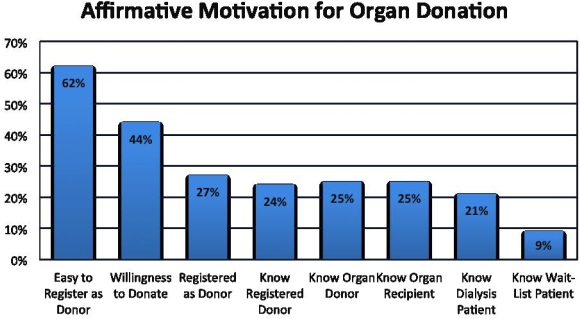Assessing Transplant Attitudes: Understanding Minority Men's Perspectives on the Multifarious Barriers to Organ Donation
Glickman Urologic and Kidney Institute - Minority Men's Health Center, Cleveland Clinic, Cleveland, OH.
Meeting: 2015 American Transplant Congress
Abstract number: A64
Keywords: African-American, Donation, Kidney transplantation
Session Information
Session Name: Poster Session A: Donor Management: All Organs
Session Type: Poster Session
Date: Saturday, May 2, 2015
Session Time: 5:30pm-7:30pm
 Presentation Time: 5:30pm-7:30pm
Presentation Time: 5:30pm-7:30pm
Location: Exhibit Hall E
African-Americans comprise 13% of the US population; yet compose 34% of the kidney transplant waiting list and only 14% of cadaveric donors and 11% of living donors. There are many barriers to organ donation among minorities. This study investigates the societal misconceptions and demographic health factors that correlate with minority participation in organ and tissue donation.
A Health and Wellness survey was designed which comprised of fifty-seven questions that assessed participants' demographic information, medical history, health literacy, professional background, and opinions regarding organ transplantation. Additionally, participates also completed QualityMetric's Short Form-8 (SF-8) survey to assess physical and mental health and quality of life.
326 surveys were administered to minority men who visited Cleveland Clinic. The majority of men identified as African-American and 55% were below the age of 40. Though 44% of participants were willing to donate, only 27% were registered as organ and tissue donors. Affirmative motivation for donation and reasons given to explain unregistered donor status can be see in table 1 and 2 respectively. Minorities who held misconceptions about organ donation such as believing they were too old or unhealthy to donate had lower general, physical and mental health scores (p=<0.0001). 

Minorities aware of the shortage for organs or who know a registered donor, an organ recipient, a dialysis patient, or someone on the waiting list are more willing to donate organs. Improving the general, physical and mental health of minorities, coupled with an active education outreach program could result in a greater percentage of minorities registering to be organ and tissue donors.
To cite this abstract in AMA style:
Hinck B, Naelitz B, Jackson B, Howard M, Nowacki A, Modlin C. Assessing Transplant Attitudes: Understanding Minority Men's Perspectives on the Multifarious Barriers to Organ Donation [abstract]. Am J Transplant. 2015; 15 (suppl 3). https://atcmeetingabstracts.com/abstract/assessing-transplant-attitudes-understanding-minority-mens-perspectives-on-the-multifarious-barriers-to-organ-donation/. Accessed July 13, 2025.« Back to 2015 American Transplant Congress
